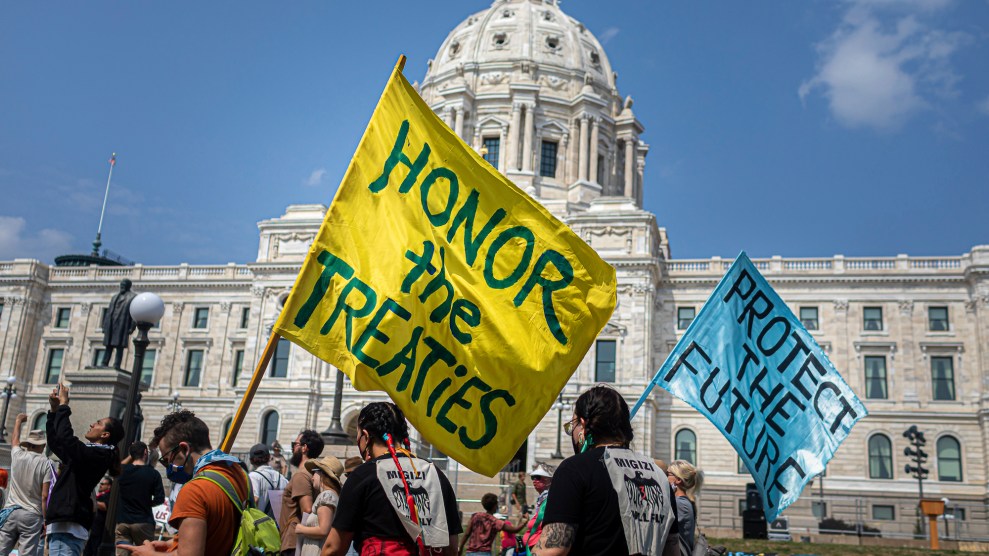Another good day for Howard Dean. Landing Bill Bradley’s endorsement isn’t the same thing as getting Al Gore’s, of course, but it helps — by giving waverers another reason to take Dean’s candidacy seriously.
Bradley, a three-term senator who ran for the Democratic nomination against Al Gore in 2000 as a straight-talking outsider, clearly sees Dean as a kindred spirit. At their joint appearance in Manchester, N.H., Bradley touted Dean’s campaign as America’s new hope.
“His supporters are breathing fresh air into the lungs of our democracy. They’re revitalizing politics, showing a way to escape the grip of big money and to confront the shame of forgetting those in need.”
And Dean was clearly enjoying the moment.
“If there’s a candidate in the Democratic Party who can bring together the two candidates for president the last time, that fought like crazy, maybe we’re not the weakest candidate. Maybe we’re the strongest candidate, and the only one that can unite all the Democrats around the country who get disappointed in the Democrats in Washington.”
How much does Bradley’s backing help Dean? Columnist Glen Johnson writes in the Boston Globe that it carries clear advantages.
“In winning Bradley’s support, Dean would not only garner the backing of a candidate who nearly won the New Hampshire primary in the last campaign, but also a candidate like himself who made expanding health insurance for Americans a central theme of his campaign.
Not only is Bradley a popular figure in Democratic circles, but the former professional basketball player and one-time Rhodes Scholar also has lucrative fund-raising contacts in greater New York, where he has been working as an investment banker and management consultant.”
Dean’s rivals, who are getting a lot of practice in this kind of thing, tried to seem unimpressed. Wesley Clark told reporters that citizens, not endorsements, determine elections, and John Kerry said of Bradley: “He doesn’t vote in Iowa and he doesn’t vote in New Hampshire.” But it doesn’t look good for Kerry, whose candidacy has wilted in proportion as Dean’s has bloomed, to be snubbed by a former Senate colleague who’s seen him up close.
Kerry probably saw it coming, though. In an interview posted a while back on SF Politics.com Bradley explains why Dean can appeal to the broader American public.
“I think Howard Dean has the strongest free media presence (of the Democratic contenders) and he has managed to broaden that to a broader protest and critique of the Bush administration, and the last things he got to do, he has to be able to broaden that to a broader agenda, more than simply anti-war. And he has to have an aspirational component to what he is saying so that people will feel that they are empowered by him to be as good as they can possibly be.
Joe Lieberman has gotten his campaign on track, finally, and is a serious candidate. Bob Graham is an outstanding public servant….”
And Kerry?
John Kerry – well, let’s go on. Then you have the other candidates, Sharpton, Braun, Kucinich they each have their own flavor to offer and each have their own perspective. But they’re not likely to be serious in terms of numbers of delegates.”
If Dean is trying to reach out to moderate Democrats, it’s doubtful whether the Bradley endorsement will give him much of a lift. But Anita Dunn, the communication director of Bradley’s 200 campaign, told the New York Times that Bradley’s endorsement, following on Gore’s, would create a positive perception of Democratic unity around Dean.
But some analysts think that any positive media play for Dean is a step in the right direction. As one Democrat, speaking anonymously to the Times explained, a single good day in the media can mean a lot.
“[Dean’s] at a point now where he’s got a dozen news cycles between now and Iowa…Every day that you can fill that news cycle with a positive story —or at least not a negative story — is a good day.”















